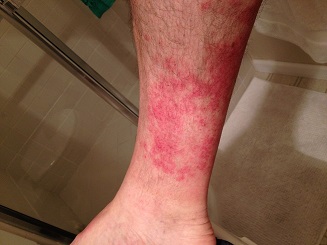
Hiker’s rash from the dry weeds and stickers?
The attending emergency room physician slipped her camera phone out of her pocket, focused on the patient’s leg and snapped a picture. As the patient sat in slightly stunned silence, the doctor posted the picture to her Facebook, Instagram, Pinterest, and Twitter pages with the caption, “Has anyone ever seen a nasty leg rash like this before?” Within minutes her phone chimed with a reply from a doctor in South America, “That looks exactly like the rash that occurs from the manchineel tree.”
“Have you been out of the country?”, the doctor asked.
“Yes, we just returned from visiting family in Venezuela”, replied the patient with the swollen leg rash.
Hospitals tweeting for good
This scenario didn’t happen. But the possibility of crowd sourcing the diagnosis of strange or rare ailments might have potential as the health care industry wades further into the social media pool.
Hospitals increase use of social media
A recent compilation of statistics by Master of Health Administration Degrees (see below) suggests that hospitals are leveraging social media more in their operations and marketing. The top uses of social media by hospitals are to educate local residents on medical issues, promote community and respond to local disasters.
The most popular social media site for hospitals is Facebook. Over 1200 hospitals now have Facebook pages. From some of the Facebook pages of hospitals I reviewed in Northern California a common denominator was how few “Likes” each had.
Dignity Health San Francisco Likes = 1167
UC Davis Medical Center Sacramento Likes = 816
Sutter Hospital Roseville Likes = 1533
Some of these hospitals have more employees than Likes. Gosh, where are all the people that had their lives saved in these hospital emergency rooms? Maybe they didn’t like the food. The content on the pages were pretty similar with Dignity in San Francisco posting more YouTube videos and UCD focusing more local news. None of the content verged on divulging any private information and most of it is all rather boring and corporate. Maybe that’s why none have that many “Likes”. On the upside, several of the hospitals in the Sacramento area can’t even muster the strength to establish a Facebook page.
I just posted a pic of my infected toe
While the hospitals seem skittish to post real medical information on social media, their prospect clients are not. Close to 1/4 of all social media users have posted about a health issue or update. Heck, I’ve written blogs on some of my medical conditions from rashes to itching. People want answers to nagging questions. It is great that health care is getting social, but are they providing value in the form of answers?
People want communication and information from social media
Individuals and families are looking for any information that might help them avoid a trip to the emergency room or hospital stay. There is way too much medical and nutritional babble happening on radio, TV and on social media. People are looking for trusted sources, such as doctors and hospitals, to supply them with current relevant medical information. Social media is a great path way because the message can be repeated and in various forms. It also allows people to interact with the content in the form of comments. Of course, that is the problem if someone posts private medical information in a comment.
Please tweet the cost of a colonoscopy
Hospitals and doctors are not likely to tweet or post any private information. However, since they are becoming more social media savvy, I hope they will consider posting some of their prices. Beyond staying healthy, families are trying to figure out how much doctor office and hospital procedures cost. Forget the post about telling me to drink water during the summer Mr. Hospital Social Media Manager. Post how much it will cost for my wife to deliver her baby in your hospital. Oh, but that might be private hospital information that they don’t want to share.
Image source: www.master-of-health-administration.com